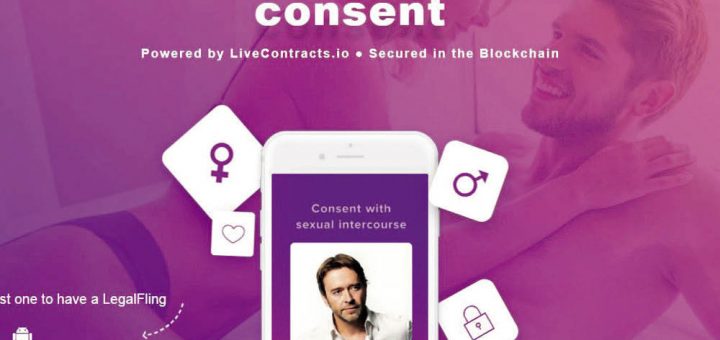Why we shouldn’t define consent through an app

What LegalFling leaves out
By Anna Junker, News Editor
Following the rise of the #MeToo movement against sexual harassment and assault, Dutch tech company LegalThing wants to create an app that will allow you to legally consent any time you get intimate with your partner. But that’s not exactly a great idea.
The app, called LegalFling, lets users set out which practices they are and aren’t comfortable with, matching users based on their sexual preferences while recording sexual consent in a legally binding agreement. The proof of consent is all done through blockchain, which is a digital ledger in which transactions made in bitcoin or another cryptocurrency are recorded chronologically and publicly.
“Asking someone to sign a contract before having sex is a little uncomfortable,” LegalThings’ CEO Rick Schmitz said in a press release. “With LegalFling, a simple swipe to consent is enough to legally justify the fling.”
Motherboard describes how users digitally “sign” a contract within the app which LegalFling then attaches a “cryptographic hash of the interaction (a string of characters that represent the text) to a small amount of cryptocurrency” that’s sent through a blockchain platform similar to that of Bitcoin.
Sounds confusing? If so, that might be a major problem. Consent needs to be clear, affirmative and ongoing, not a one time agreement that this app makes it out to be.
“Are you into BDSM but your fling isn’t?” LegalFling’s ‘Easy as One, Two, Three’ section states.
“LegalFling matches sexual preferences automatically, so you’re immediately aware what your fling doesn’t appreciate and will not consent to.”
Or this could be a revolutionary idea, maybe two or more people who want to get it on could just talk about their preferences face to face.
The definition of BDSM one would consent to according to LegalFling is also concerning.
“Allow erotic practices involving bondage, discipline, dominance and submission, sadomasochism and other related interpersonal dynamics,” a screenshot of the app states.
That’s an incredibly broad definition of what BDSM is and the way the app is set up in order to just tap to consent, it seems like users would consent to all of those things. That’s going to be incredibly problematic if one user likes bondage only while another is into sadomasochism.
LegalFling does address the ability to say no. “‘No’ means ‘no’ at any time. Being passed out means “no” at any time,” the FAQ page says. “Revoking consent is always done verbally at any time and without giving a reason. You never use the app to revoke consent. In case the rules of consent were not honored, the app can be used afterwards to secure a statement and get professional help.”
Both Gizmodo and Motherboard reported that users would be able to revoke consent using the app — which is totally a great idea to stop whatever is happening to grab your phone, open the app and change your consent settings. However, when exploring LegalFling’s website, the only part addressing consent is the above quote which states, “you never use the app to revoke consent.” So that’s a little bit of conflicting information, which again, is not what consent is about.
If one were to revoke consent using the app, this would create a new hash, effectively saying an assault occurred during the date while the original hash still remains. The fact that there is record of consent, even if revoked, could prevent someone from coming forward to report an assault because of the existence of the record of consent.
Those who have been sexually assaulted are often not believed just through word of mouth, but having a written record of consent will likely not help their case.
Again, this comes back to ongoing, affirmative and enthusiastic consent. This shouldn’t have to be up to an app. It cannot be stressed enough that that is what is needed for a healthy sexual interaction. If you don’t know how to do this, you should not be relying on an app, let alone having sex! This app is two tech-bros who are capitalizing on a social moment in order to make a profit. There is nothing altruistic from their actions.
While the app is still in development, however the creators hope it will be available to the public by the end of February.




